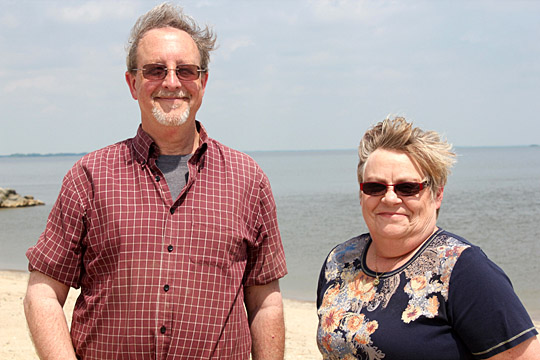Battling nine-inch waves in chest waders one windy Wednesday morning, University of Toledo senior Kevin Corbin managed to stay dry.
“It’s not a bad way to start every day,” Corbin said while holding steady a wave stick.

UT senior Kevin Corbin held a wave stick at Maumee Bay State Park to collect data that helps forecast water quality for Lake Erie swimmers.
“We get the results up on the Ohio Nowcast website by 9:30 a.m. to inform families if there is a swimming advisory before they leave the house and head for the beach,” said Pam Struffolino, UT Lake Erie Center research operations manager. “It’s convenient.”
Although the traditional E. coli test takes a lab, a petri dish and 24 hours to process sample results, the UT Lake Erie Center team has developed a model using weather and water conditions to forecast a prediction immediately. The traditional water sample results are later used to validate the model.
“We collect environmental data, including wind direction, solar radiation, change in lake level, rainfall and water clarity. No delay in a decision thanks to our database,” Struffolino said while barefoot on the beach. “We’ve been more accurate using the model than the traditional method since we began collecting data eight years ago.”
“Sunshine actually kills bacteria,” said sunglasses-clad Ryan Jackwood, a UT graduate student, while recording numerical values on a clipboard. “A south wind is good, too, to drive bacteria and sediment out into the lake rather than onto the shore.”
On this first Wednesday of June, the lake was wavy with a northeast wind.

Dr. Daryl Dwyer, UT ecology professor, and Pam Struffolino, research operations manager at UT Lake Erie Center, are on the public beach at Maumee Bay State Park to oversee the daily water testing.
The UT team ended up issuing its second swim advisory of the 2016 season.
The University is under contract with the Ohio Department of Health to post swimming advisories for the beach with the Lake Erie Center’s forecasting model based on the likelihood that E. coli exceeds safe levels.
“We’re out here working to inform members of the public of a potential health hazard if they choose to swim on days that have an advisory posted,” Jackwood said.
Last year, the team saw a reduction in the amount of beach postings caused by E. coli. It’s attributed to work being done to help improve the water.
Dr. Daryl Dwyer, UT ecology professor, recently headed a $1.8 million wetland restoration project on the edge of Maumee Bay State Park through a U.S. Environmental Protection Agency Great Lakes Restoration Initiative grant. That wetland also captures phosphorous and sediment in the watershed before it can enter Lake Erie.
“We’re getting 70 to 90 percent reduction in bacteria coming through the wetland, depending on the day,” Dwyer said.
This marks the seventh year UT is using predictive forecasting for E. coli.
“We’re now starting to develop a model for toxins, like microcystin,” Struffolino said.
As the group leaves the beach, Corbin is already thinking about tomorrow morning.
“Next time I’ll bring my swimming trunks,” Corbin said. “I could do without the waders.”